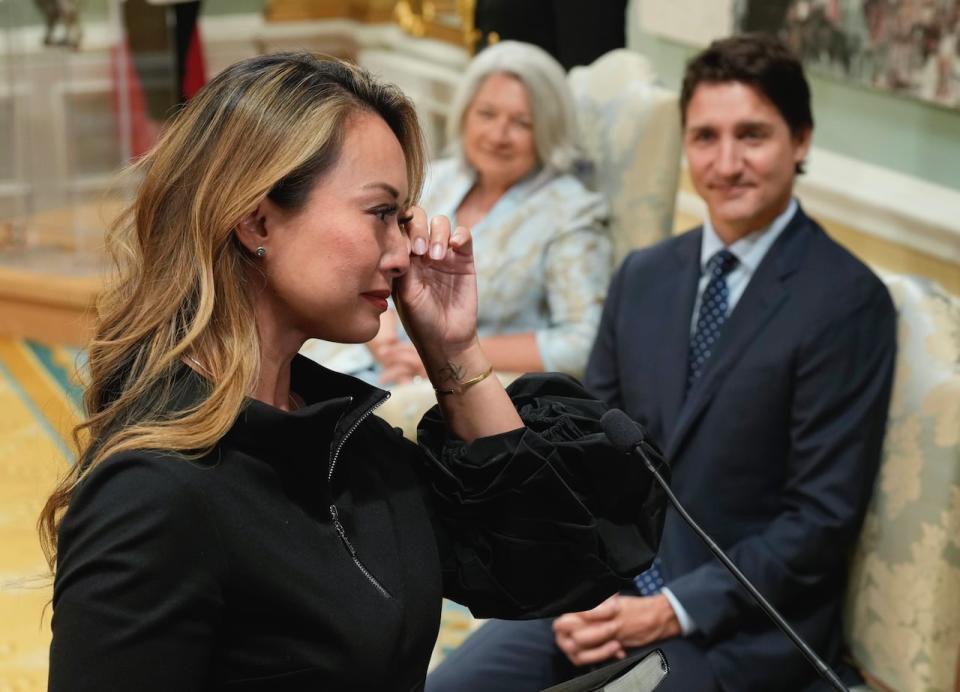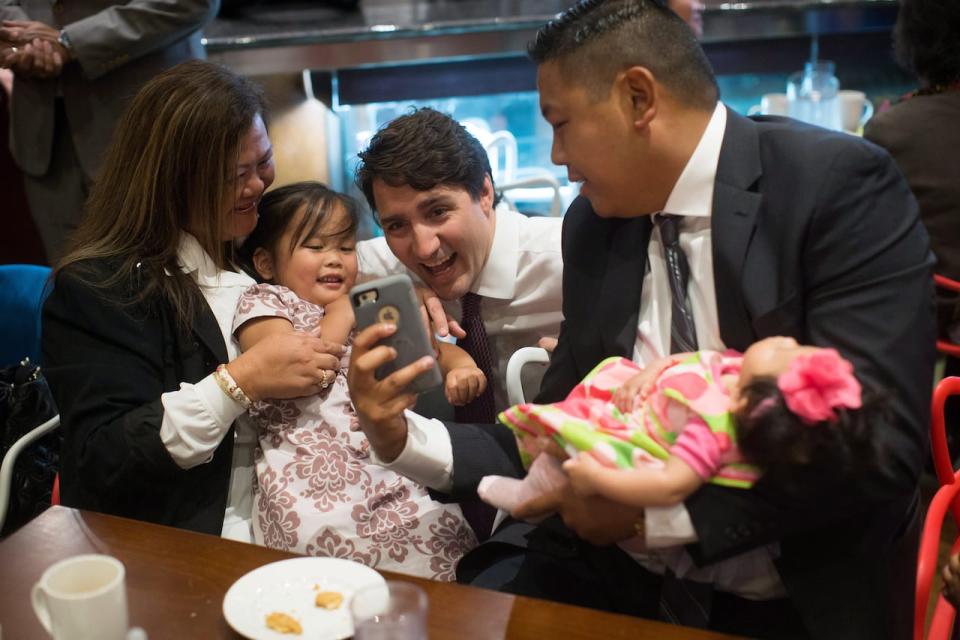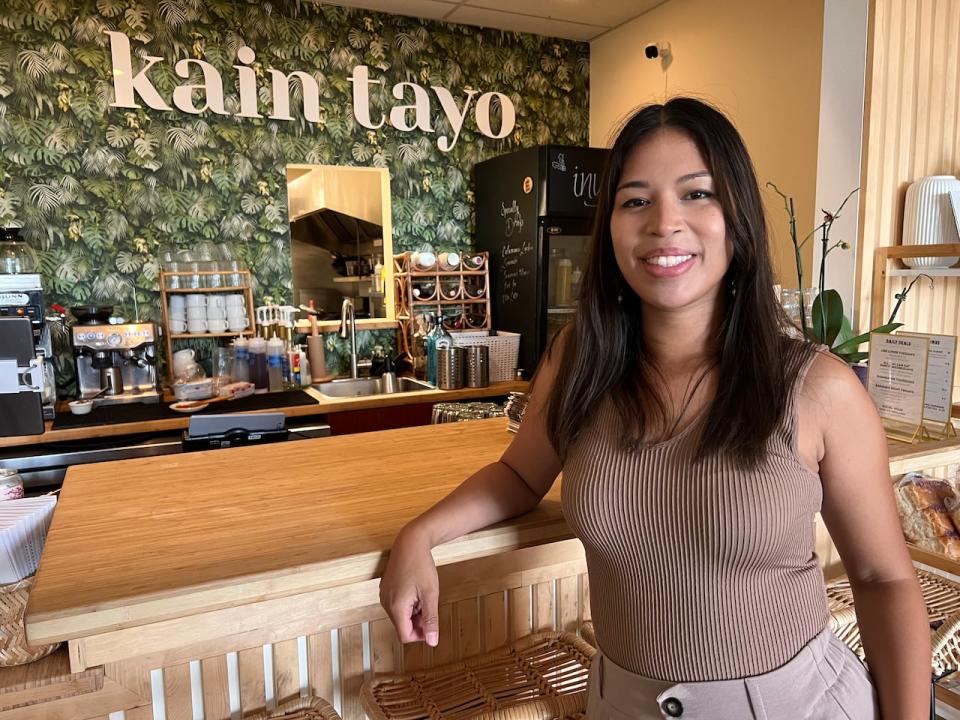
The tears Rechie Valdez shed as she took the oath as minister of small business in this week’s federal cabinet shuffle marked a breakthrough for her — and for the Filipino community she represents.
“It was a profound moment for me to know that I was representing the close to one million Filipinos now here in Canada,” she told CBC News on Friday.
Filipinos are arguably the most politically underrepresented group in Canadian federal politics.
A community that, according to the latest census, has 960,000 members has not had a single Filipino-Canadian representative in Parliament since 2004 other than Valdez, who was elected in 2021. Rey Pagtakhan became the first Filipino-born Canadian to be elected to the House of Commons in 1988 and served in the Liberal government’s cabinet.
By comparison, Canada’s 770,000 Sikhs were represented by four out of 40 ministers in Prime Minister Justin Trudeau’s first cabinet. Prominent Sikhs outside the government include NDP Leader Jagmeet Singh and Conservative finance critic Jasraj Singh Hallan.
Rechie Valdez has experience in small business, having run her own bakery. She said she takes seriously her opportunity to serve as a voice for a community that is underrepresented.
“I can tell the community across Canada I’ll definitely be advocating on your behalf and I will continue to listen to your needs and bring it up to cabinet,” she said.
Census data shows Filipino-Canadians have a unique demographic profile, said analyst André Bernard of Statistics Canada.
“The Filipino population have lower unemployment rates and lower poverty rates than the general population,” he said.
Fewer than five per cent of Filipino-Canadians fell below the poverty line in 2020, compared to over eight per cent of the general population.
“But they also have lower wages,” said Bernard. “They have lower employment income.”

Prime Minister Justin Trudeau poses for a photograph with a family during a visit to a Filipino restaurant in Surrey, B.C, on May 19, 2017. A Statistics Canada study found Filipinos have higher rates of employment than people who are Canadian-born. (Darry Dyck/Canadian Press)
Filipino wage-earners average $26.59 per hour, as opposed to a national average of $33.22 per hour and $31.23 per hour for all racialized groups.
Filipinos “tend to be over-represented in certain industries and occupations,” Bernard said. “For example, over a quarter of women are working in health occupations. That’s much more than for the general population.
“As well, men are more likely to work in manufacturing and utilities than the general population.”
Filipino immigrants have historically shown a willingness to move to where the jobs are, creating communities such as those that serve the meatpacking industry on the Prairies. The way that Filipinos have entered Canada also has shaped the community, said Bernard.
“Over a third of Filipino immigrants who arrived since 1980 were admitted under the caregiving program in Canada … compared to three or four per cent for all immigrants,” he said.
Low representation in the business world
The 2016 and 2021 census revealed that Filipinos ranked lower than any other Canadian ethnic group in rates of self-employment in both the male and female rankings.
In June of this year, just 4.9 per cent of Filipino workers were self-employed, compared to 13 per cent of the general population.
(Self-employment does not map precisely onto business ownership — but it does overlap fairly closely. Entrepreneurs are by definition self-employed, and any self-employed person making revenue over about $30,000 a year typically has to register a business.)
Jackie Wild owns Tito Boy restaurant in Winnipeg’s south end. She said Filipinos don’t lack the entrepreneurial bug.
“Back home, entrepreneurism, being a business owner, is very, very commonplace,” she said. “Whether you’re a small business owner, maybe you’re a farmer, maybe you are like a side hustler doing things on top of your day job.
“Being a business owner myself, and having witnessed a lot of the obstacles that folks from our community face, it’s not easy to start up a business coming from an immigrant community, whether you’re a newcomer or even a subsequent generation. Because a lot of our family members … my family included, when they come to a country like Canada, they are in survival mode. They are simply trying to just make ends meet and to be able to pave the right path and future for their children and for their grandchildren.

Jackie Wild, owner of the Tito Boy restaurant in Winnipeg, said Filipino-Canadian entrepreneurs face many obstacles. (CBC News)
“There is a growing number of Philippine business owners in our community. However, a lot of them are just humbly doing the work. They have their heads down. They’re just trying to again survive day-to-day and pay the bills and feed their families. So we don’t often hear from them.”
Wild said it’s hard to break into the business world without intergenerational wealth or contacts.
“If they don’t know the communities that they can reach out to, they don’t know the resources that exist for them,” she said. “It really does discourage them from even taking that first step.”
The Trudeau government hasn’t hesitated to implement ethnicity-specific programs to help members of other communities overcome such barriers and break into the business world.
Black Canadians can apply for special loans of up to $250,000 under the Black Entrepreneurship Loan Fund. A Black Entrepreneur Startup Program offered by the Business Development Bank of Canada provides up to $60,000. The government of Canada also offers special opportunities for Black-owned businesses to bid for public contracts.
Indigenous-owned businesses also have access to startup loans of up to $500,000 and special access when bidding for government business.
No such programs or preferences exist for Filipino-Canadians trying to make it as entrepreneurs.
Greater needs, fewer benefits
“I think in terms of priorities, it was really important for us to ensure that we were starting off with marginalized communities like the Black entrepreneurs, Black women, [the] LGBTQ plus community,” said Valdez.
It’s far from clear from the statistics why the Filipino community would be denied access to the kinds of programs that were extended to communities with higher rates of business ownership.
It was the Trudeau government that insisted on restoring the long-form census when it came to power after the 2015 election, arguing that an “evidence-based” government needed good data to make good policy.
The very next census produced detailed data on the ethnic breakdown of self-employment in Canada.
The census results showed that both Black Canadians and members of First Nations were more than twice as likely to report self-employment as Filipino-Canadians.
Some segments of the Black population were well above the national average. Ethiopian-Canadian men had a self-employment rate of 14.9 per cent — higher than men who reported their ethnic backgrounds as English, French, Scottish, Irish or German.
No scholarships
Help in starting businesses is not the only area where Filipinos have been overlooked compared to other groups.
Student Karla Atanacio chairs Pinoys of Parliament, the largest Filipino-Canadian youth leadership conference. It brings some 250 Filipino youth to Ottawa every year.
She said access to higher education is also an issue.
“Tuition is getting a lot more difficult to fund, and students like me often have to find part-time jobs in order to sustain our education,” she said. “And that results in staying in school for longer and not being able to afford it, and sometimes running out of tuition money to actually help us to go through university.
“And if we’re talking about economic stability, if we’re talking about lifting a lot of people out of poverty, I think that should be a priority for the government as well.”
While there are numerous scholarship funds reserved for Indigenous Canadians and BlackCanadians, neither government nor the private sector has shown much interest in creating such funds for Filipino-Canadians.
“We’re welcoming a lot more immigrants and refugees, but is there really room for a lot of us?” said Atanacio. “There’s a rental crisis going on. And so if we really want Canada to be as welcoming as we say it is, then we have to work together with our small businesses, with our housing people who are knowledgeable in housing in order to solve this problem.”
While the government has set aside $40 million to help Black Canadians find housing, there has been no such program for Filipinos.
A community closing the gap
Despite the lack of political representation, the lack of government assistance and the relative lack of private-sector philanthropy, the Filipino-Canadian community is closing the income gap with the rest of the population and raising its profile in the business world.
Atanacio said the Filipino-Canadian community is undergoing “reinvigoration” and welcomes having a minister in cabinet.
“We’re the fastest growing ethnic group now in Canada,” she said. “But in terms of mobilization, I think it was only in the last few years that we looked around and were like, wait, we are just as capable and … our stories are worth telling, that we really came together and decided that this is the time for us to step up.”
She said the community has high hopes for its first cabinet insider.
“It’s different when you actually have your own person representing yourself up there,” she said.
Valdez said she knows there are many expectations focused on her new role.
“My hope is that now that I am here,” she said, “I’ll be able to put forward my ideas and recommendations that can better further support the Filipino community.”
*****
Credit belongs to : ca.news.yahoo.com
 Atin Ito First Filipino Community Newspaper in Ontario
Atin Ito First Filipino Community Newspaper in Ontario






